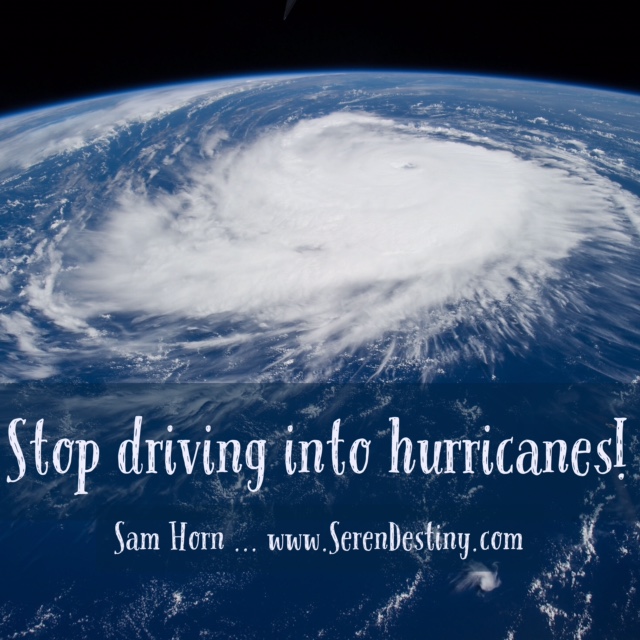The very first day of my adventure, I was driving to Chesapeake Bay to stay in a beachfront home a friend had graciously loaned me. The only problem? A hurricane was also headed there. As the winds whipped up and I could hardly see the road through the rainstorm, a thought bubble appeared above my head, “Why drive into a hurricane?!”
Why to keep my commitment, of course. That’s what I was taught to do. We keep our commitments – no matter what.
.
But this was unsafe. Maybe under the circumstances, it would be okay, even advisable, to “break a promise?”
I called my friend and told her I had changed my mind. She didn’t hesitate, she said, “Good decision. There will be another, better time to stay at the beach-house.”
An hour later, I was safely ensconced in a historic B & B in Annapolis, half-asleep under a fluffy down comforter. What a relief.
My epiphany? “Where else in my life am I automatically keeping commitments – out of habit or “integrity” – that were made long ago that are no longer relevant or healthy? Where else am I honoring promises I made to people who don’t care if I change my mind; they may even applaud or be grateful for my decision?”
My friend Mary LoVerde says this has become a “go-to” phrase in her family. When she or one of her kids is about to head into a stormy situation, they stop and ask themselves, “Am I driving into a hurricane?”
If we know in advance we’re heading into a hot mess, and we’re doing it simply because we said we would, maybe it’s wise to NOT DO IT. Maybe there are other options that are a win for all involved.
Sometimes it’s not selfish to break a promise or opt out of a commitment; it’s smart.
You may be thinking, “But we’ve got to keep our commitments. That’s they only way people can trust us.”
That makes sense and that’s what I thought for thirty years. However, this experience opened my eyes to the fact that keeping commitments – no matter what – is not always optimal.
Honoring our “word” is an important characteristic. But a strength taken to an extreme can become our Achilles Heel.
If a relationship or commitment is not working anymore, if it’s become toxic or stormy; if you wish you hadn’t made this promise and want to change things; why not have a conversation with your client, colleague or partner to get their point of view?
Maybe they feel the same way. Maybe they have an idea on how to adapt or update the agreement so it works better for all involved. Maybe, together, you can come up with a more current, effective course correction and collaboration that benefits both of you.
A colleague told me this phrase, “Are we about to drive into a hurricane? WHY?!” has become part of their family lore.
For example, her daughter and son-in-law dreaded going to his parents’ house for Thanksgiving because it was always a war zone. It was a day of uncles, aunts, and cousins all complaining and at each others’ throat. Not a pleasant way to spend a holiday, yet this couple went year after year out of a sense of obligation. Even though it upset them to be in the midst of such conflict; they kept doing it because they’d made a commitment.
This past year, they got creative. They got in touch with his folks and invited them to join them on a different weekend at a timeshare they’d purchased. Instead of spending money on traveling to his parents’ house for Thanksgiving, they offered to pay the grandparents’ way to join them at this beach resort.
What a brilliant solution. The kids were happy because there was plenty to do at this oceanfront property, and the parents and grandparents were happy because they had together time without juggling everyone else’s personalities and demands.
Next time you’re about to drive into a hurricane, ask yourself, “Why? Are there options I haven’t explored yet?”
You just might discover a better route, a new route, that bypasses the drama and trauma and ends up being a win for everyone.


 Sam Horn is the Intrigue Expert, a world-renowned Author, Keynote Speaker and communications strategist who has coached the world’s top entrepreneurs and executives.
Sam Horn is the Intrigue Expert, a world-renowned Author, Keynote Speaker and communications strategist who has coached the world’s top entrepreneurs and executives.
Comments are closed, but trackbacks and pingbacks are open.